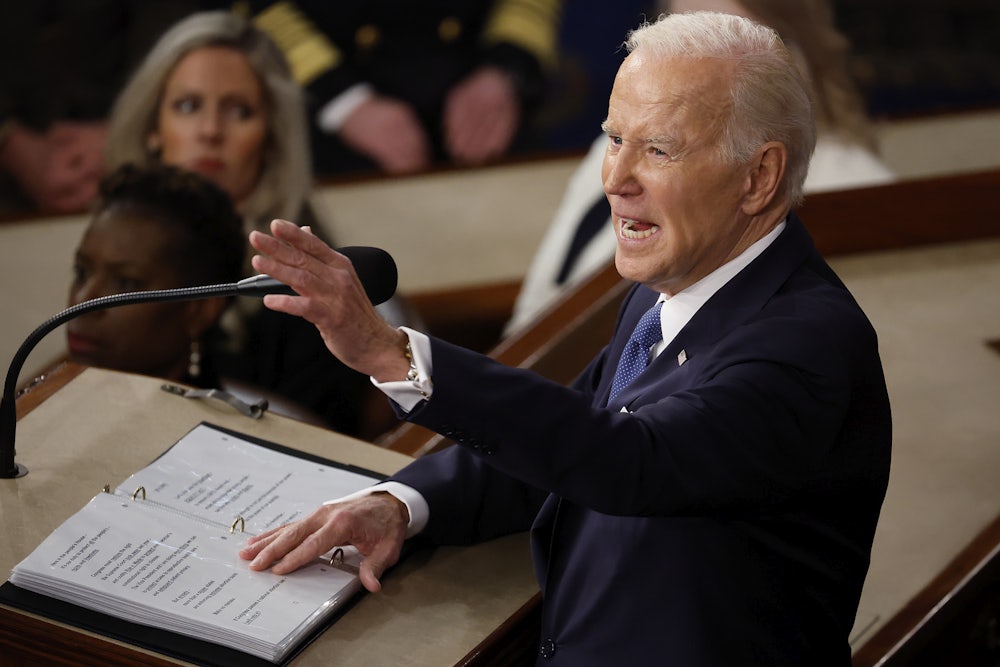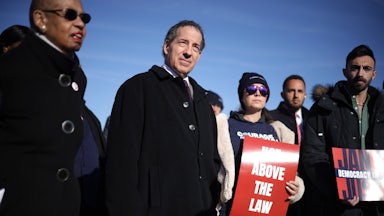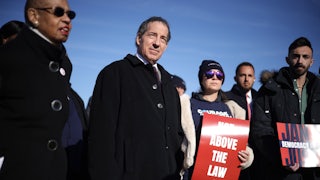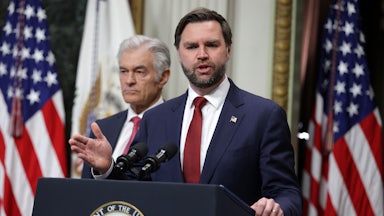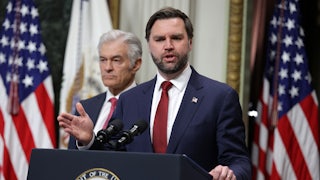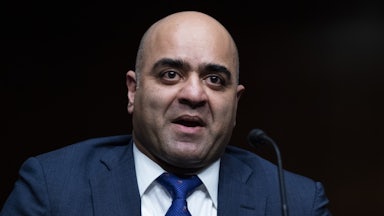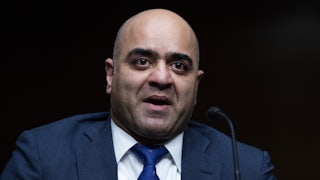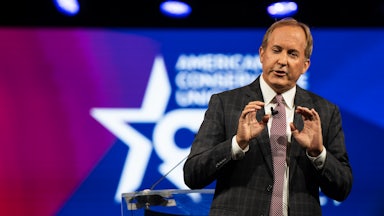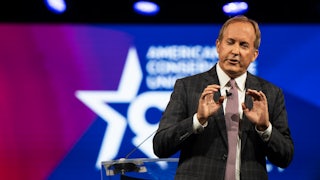Thursday brings the State of the Union address (didn’t these use to happen in January?). Let’s cut to the chase. What does Joe Biden need to do? It’s never been more important for him to talk about the future, the economy, and a firm commitment to the working class.
Biden is in a near-disaster zone with working-class voters, it’s true. Before we get into that, let’s quickly correct one assertion often made by pundits that’s just wrong. Biden does not need to win the working class. He didn’t in 2020. Exit polls from that year show that Trump won non-college voters—the closest proxy to working class in such polls—by 50 to 48 percent. Trump crushed Biden among white voters with no college degree, 67 to 32 percent. But Biden pummeled Trump by even more among voters of color with no college degree, 72 to 26 percent.
If Biden can just keep it close among non-college voters overall (who comprised 59 percent of the electorate in 2020), he can win. But he’s not there right now, especially with the erosion of support among Black and Latino working-class men that we’ve seen in poll after poll. If he can’t change that, he’s in deep trouble.
For someone like me, who pays very close attention to economic policy, this state of affairs is maddening. But it’s not puzzling. And, yes, there’s a big difference between these two emotional states. Let me explain.
It’s maddening because middle-out economics—the economic theory that Biden embraces and promotes—is entirely about shifting wealth from the top back to the middle and working classes. The whole idea in a nutshell is that growth comes not from cutting rich people’s taxes and waiting for them to invest, but from making private and public investments, financed in part by rich people’s money, directed toward the middle and working classes so that these people have a fair shot at fulfilling their potential and living better and more secure lives. Throw in his passionate support of labor unions, and Biden is more on the side of working-class people than any president since arguably Harry Truman.
But the fact that he’s not getting a lot of credit is not puzzling, because either (a) nobody knows about this wealth transfer or (b) they kind of know it, but they don’t really believe it. There are reasons for this: First, Biden has not been a very effective salesman for his ideas and accomplishments. He also suffers for the fact that his party, writ large, isn’t entirely on the same page. A lot of Democratic senators and House members don’t even understand what middle-out economics is, and outside of a small handful of Democratic elected officials, you never hear much talk about transferring wealth and power from the top to the middle.
The second group, those who kind of know it but don’t buy it, largely just accept the economic conventional wisdom of the last 40 years: namely, that the path to growth relies on some combination of tax cuts and vague commitment to getting the government out of the way. People have been so conditioned to think this that it colors everything they think about economics. (Every time a debate moderator asks a Democrat, “But how will you pay for [insert idea here]”—a question rarely put to the Republicans who are routinely running up deficits—these notions get reinforced.) Practically everybody who follows economics will tell you, accurately, that inflation was almost wholly the result of supply chain breakdowns and that increased government spending contributed on the margins. But in polls, huge numbers of respondents finger government spending as the culprit. Why wouldn’t they? They’ve been told all their lives that government spending is wasteful and evil.
Changing 40 years of conventional wisdom is hard, and the Democrats have done a poor job of making their case. They don’t sing from the same hymnal at all. As a result, not many Americans recognize the philosophical thread that ties together the infrastructure law, the American Rescue Plan, the Inflation Reduction Act, the law bringing chip manufacturing back to our shores, and the various efforts the Justice Department and Federal Trade Commission have undertaken to reduce monopoly power: All of them are about bringing jobs, wealth, and political power back to working people.
Democrats don’t say these things over and over and over the way these things need to be said. Republicans, by contrast, are deeply committed to working in lockstep: They will say, over and over and over the way these things need to be said, that government is the problem, that Biden caused inflation, and all the rest. So yes: I am frustrated. But I am most definitely not puzzled.
We are where we are. Back to this Thursday. Early reports indicate a speech “heavy on economic populism,” and that’s all to the good. I hope he makes a strong case for all the good things he’s done that are benefiting or will soon benefit working people. I hope he’ll have knives out for some of the most common enemies of working people, and names some names from the stage. I hope he has a number of specific proposals for a second term that would directly benefit working people and would take money from the rich, and I hope he says this plainly. Poll after poll shows around two-thirds of people supporting higher taxes on the rich. And get this: A poll of 2,300 millionaires in the G20 countries conducted for the group Patriotic Millionaires shows three-quarters of them saying they’re willing to pay higher taxes. They signed a public letter titled “Proud to Pay More.”
So I hope Biden makes taxing the rich to pay for this and that specific benefit to working people part of the fight. Force Donald Trump and the Republicans to defend lowering taxes on the rich and denying working people those benefits.
I also hope for a dramatic gesture that sets the terms of the debate. Last September, I wrote a column arguing that Biden should speak of an Economic Bill of Rights, borrowing from some of FDR’s rhetoric in the 1944 campaign. Couching his proposals in an Economic Bill of Rights or something like that would put the White House on the offensive and would say to working people that these things—a fair wage, affordable housing, affordable health care and drugs, affordable education—are your rights. Let the Republicans call it socialist. Biden and his party should welcome that fight.
Obviously, the speech needs to cover a lot of territory. He does need to address the age question that’s dogged him. He has to talk about democracy, as well as abortion rights and reproductive freedom. And he has to plot a path to a less ruinous Israel and Gaza, on which I hope he makes it clear to Bibi Netanyahu that unconditional support for this slaughter is about to end.
But at bottom, for your average swing voter who’ll decide this election, the main thing will probably be what it always is: the economy, and the candidates’ plans for the future.
And I have news for you on this point that you won’t want to read. Don’t sell Trump short here. Over the weekend, I watched his Saturday Greensboro speech. Yes, there were a couple malapropisms, and yes, he inveighed against the “Marxists” and so on. But the bulk of the speech—not the headline-grabbing part, because his newsier soundbites came elsewhere—was devoted to economics.
And I will tell you: To a low-information swing voter, I could easily see his argument being persuasive. First of all, he wasn’t crazy. He was pretty controlled and sounded almost like a normal politician. Second, he does have things to boast about. Income did grow under Trump. He did pressure China to buy more American grain exports. The country did become energy independent during his tenure (well, sort of). Naturally, he lies a lot about the extent to which all these things were true—for example he loves to say that energy independence is gone under Crooked Joe when in fact the numbers have gotten even better. But these things happened under his watch. If we pretend they didn’t, we’re not dealing in reality.
Biden will need a strong economic argument to counter Trump’s. And he is in a hole right now. He needs to emerge from this speech with working people thinking, OK, I guess that guy is on my side. Then he needs to keep talking that way, and every Democrat needs to fall in line.
